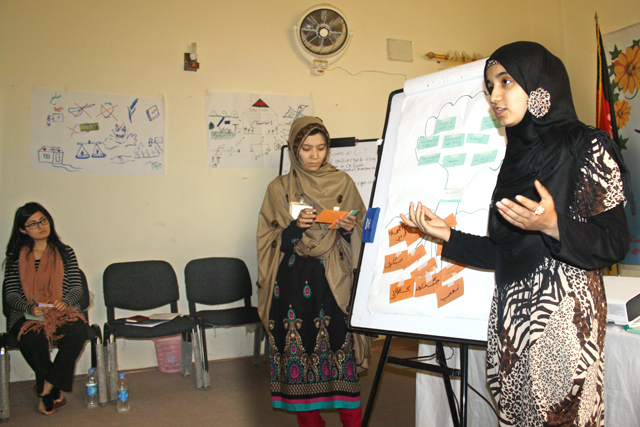The U.S. Institute of Peace partnered for the first time recently with a private university in Afghanistan to conduct a five-day training for students, civic activists and Afghan government officials.
The workshop focused on principles involved in preventing, managing and resolving conflict peacefully, and an explosion nearby on the fourth day provided a visceral example of the sort of violence the participants face as they try to prevent local disputes from fueling the wider war.
The partnership with Gawharshad Institute of Higher Education (GIHE) sought to teach basic concepts and methods of conflict resolution. Discussion revolved around factors that lead to conflict and how violence can be prevented, managed or ended through peaceful means among individuals, in groups or communities, or at the national level.
The workshop, held June 15-19, brought together a diverse group of 24 participants, including students from GIHE, with the majority of participants from local and international nongovernmental organizations, and the Afghan government. The diverse combination of participants allowed the training to become highly interactive as they brought in personal, community, and professional examples to relate the theories to practical situations.

In the ice breaker on the first day, the participants were asked to envision what a peaceful Afghanistan after 2014 would include and, in some cases, preclude. The groups were asked to visually represent things they felt were important. On flip chart paper posted on the walls, they proceeded to draw images that illustrated themes of nonviolence, transparency, human rights, and democracy as clear priorities.
Throughout the course, the participants provided anecdotal examples of how conflict affects them in their daily lives. One of the participants talked about deep-rooted cultural traditions that often become drivers of group and community conflict.
On the national level, the participants highlighted the importance of the next year in determining the future of Afghanistan, including the April 2014 presidential elections and the need for civic awareness and empowerment. The participants brought in comparative examples from Northern Ireland, the Truth and Reconciliation efforts in South Africa, and the recent uprisings in the Middle East. Discussions also emphasized the important role youth will play in the future of Afghanistan.
Themes such as using peaceful approaches to resolving every day conflicts before they turn violent were of particular interest, including examples of nonviolent movements in India and the U.S.
Dr. Sima Samar, the current head of Afghanistan Independent Human Rights Commission (AIHRC) opened the fourth day by speaking about the role of human rights in Afghanistan and her own personal experiences in using negotiation and conflict-resolution techniques in her personal and professional life.
She talked of the peaceful days in Afghanistan when she was practicing as a medical doctor and was able to travel to the provinces and of how security conditions outside of Kabul had been better in the past, an indication that they could be again.
Dr. Samar said she was confident that the next few years, while challenging, present opportunities for young Afghans to step up and work together to bring peace. She also emphasized the gains made in the past decade, including a dramatic decrease in infant and maternal mortality rates. Afghanistan registered the biggest improvement in the United Nations Human Development Index since 2000, and life expectancy rose from 45.3 years in 2000 to 49.1 in 2012, according to the U.N.
As Dr. Samar was concluding her talk, an explosion occurred nearby that The New York Times said was heard across Kabul. Participants called family members to make sure they were all right. The participants and facilitators decided it was best to call off the rest of the day’s work and resume the next day. At least three civilians were killed in the blast, according to The New York Times.
When they resumed the following day, talk of the explosion harkened back to two days earlier and a segment of the course that had focused on resilience. The blast served as an opportunity for the participants to reflect on their own toughness and ability to push through difficult times. One participant said she saw these sorts of attacks as tactics to instill fear and that the best response is to plow on with everyday life and deny the groups responsible any sense of achievement.
As the training ended, the participants expressed interest in additional specialized workshops on topics such as negotiation, mediation, and nonviolence. University students outside of the workshop also took notice. Discussions are currently underway to offer more general introduction workshops and additional specialized training.
One participants’ comment in the course evaluation was typically touching, with all its minor grammatical glitches:
“I am so pleased to get introduced with you peaceful people and I thank god I am here and learning something that impact my life deeply,” the participant wrote. “It helps me to be as human being.”
Hodei Sultan is a program officer in USIP’s Afghanistan and Pakistan program and co-led the course with Hamidullah Natiq, a peacebuilding training officer based in USIP’s Kabul office.



